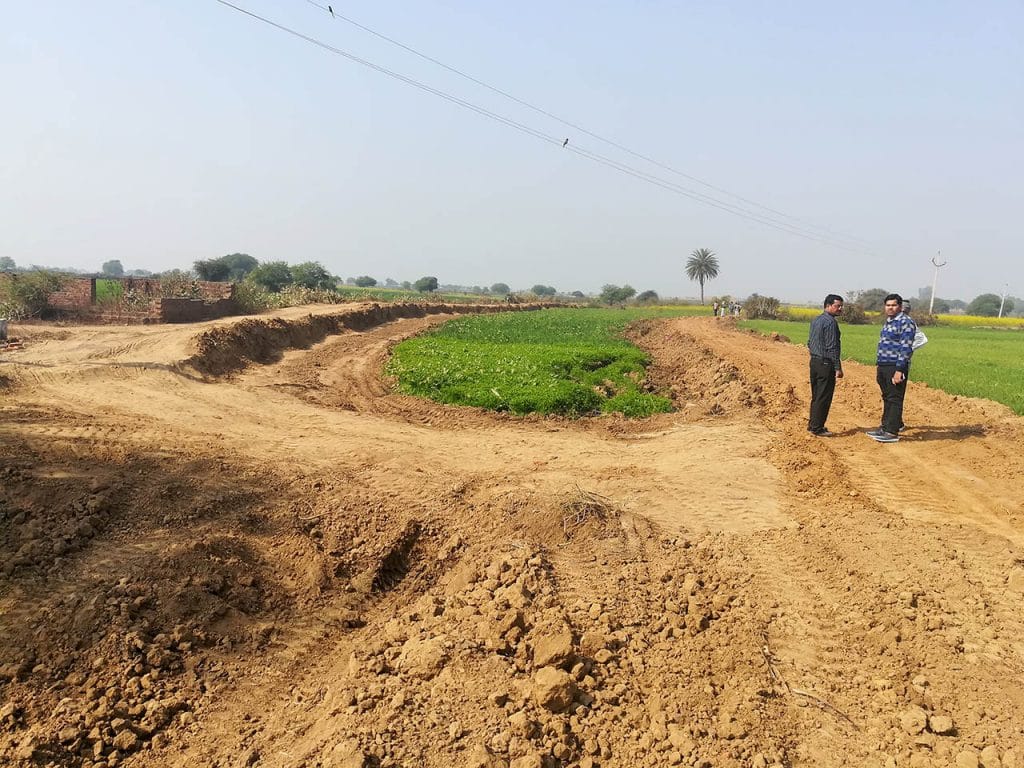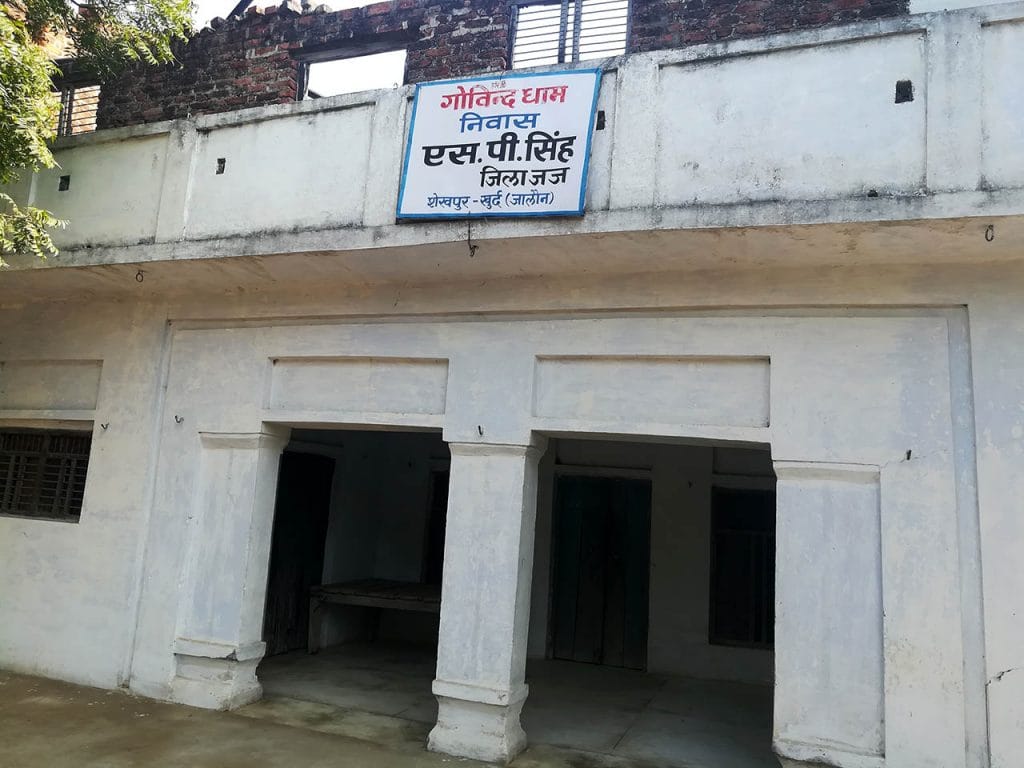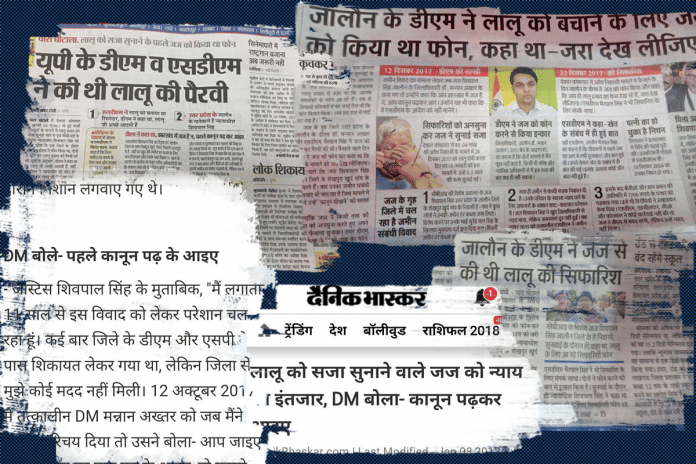Newspaper reports claimed Mannan Akhtar, DM of judge Shivpal Singh’s home district, tried to get him to go easy on Lalu. Judge denies these claims.
Jalaun, Uttar Pradesh: A Muslim district magistrate in Uttar Pradesh calls up a CBI court judge in Ranchi and asks him to go easy while sentencing Rashtriya Janata Dal chief Lalu Prasad Yadav in the fodder scam case. In return, he promises to resolve an old land dispute case involving the judge’s family since it falls within his jurisdiction.
Incredulous? Many in the regional media didn’t think so, and went to town with the story last week, alleging that Jalaun DM Mannan Akhtar had lobbied for Lalu. So much so that chief minister Yogi Adityanath ordered an inquiry based on the news reports even as the 2011-batch IAS officer vehemently denied them.
#UPCM श्री #YogiAdityanath ने मीडिया रिपोर्ट्स का संज्ञान लेते हुए झांसी मंडल के कमिश्नर से चारा घोटाले में दोषी के लिए पैरवी किए जाने के मामले की जांच करके शीघ्र रिपोर्ट देने के निर्देश दिए हैं।
— CM Office, GoUP (@CMOfficeUP) January 11, 2018
Now, judge Shivpal Singh, the man at the centre of the controversy, has sought to put it to rest and told ThePrint in exclusive comments that Akhtar didn’t call him to try and influence his sentencing of Lalu in the second fodder scam case.
“It is totally false that the Jalaun DM called me and asked me to favour Lalu Yadav,” Singh said in a telephone conversation. “The DM never called me. I don’t know from where the media got this; it is completely baseless.”
For the record, Singh sentenced Lalu to three-and-a-half years in prison.
The scoop
On 23 December 2017, while pronouncing Lalu and others guilty, judge Singh remarked in court that many people had called him to push him to give relief to the former Bihar chief minister. Although the judge didn’t give any clues about the identity of the callers, there was intense speculation about them.
Then, on 10 January, four days after Lalu was sentenced, a national Hindi daily published a “scoop” based on information from anonymous sources that Akhtar had called and tried to influence the judge by promising to resolve in return, an old land encroachment case in the judge’s ancestral village of Shahpur Khurd in Jalaun district.
The report had a multiplier effect and became the prime time topic of discussion in newspapers and television debates across the state. The Yogi Adityanath government took cognisance of the reports and ordered an inquiry by Jhansi’s divisional commissioner, Amit Gupta.
Akhtar’s insistence that he belonged to Assam and was part of the UP cadre, and had no link whatsoever with Lalu, seemed to fall on deaf ears.
The judge’s land dispute
At the heart of the controversy is a dispute – dating back to the 1990s – between judge Singh’s family and village pradhan Virendra Pal Singh over a piece of land which was converted into a dirt track leading to the fields.
Judge Shivpal is the youngest of five brothers, and all his brothers live elsewhere, except the one immediately older than him, whose name, incidentally, is also Virendra Pal Singh.
The judge’s brother alleges that this road was deliberately constructed on their land, while an adjoining road on government land had been encroached upon by some villagers under the influence of the pradhan.

In 2015, the then sub-divisional magistrate of Jalaun had tried to remove the encroachment on the government land and had instructed that it be measured and marked by erecting stone pillars. However, villagers removed these pillars later, as a result of which the road could not be moved out of the judge’s family land.
When the judge was visiting the village on vacation in October last year, he met Akhtar, who had just taken charge as the DM of Jalaun a month earlier.
“The DM kept me waiting until late evening, and later asked me to come to his office the next day,” said judge Shivpal Singh. “When I went the next day, he told me I might be a judge in Jharkhand, but I needed to study UP law.”

Asked about the judge’s comments, Akhtar told ThePrint: “I must have been busy that day, that’s why I would have asked him to come the next day. That was around Diwali, and I had to look after administration work in the area.”
Recalling his conversation with the judge in his office the next day, Akhtar said: “He raised the issue of the village road going through his land. I told him that I could measure the government land which had been encroached upon, not his land. If he wanted to get his land measured, he would have to apply to a court under Section 24 of the Revenue Act of UP, which allows the government to measure a private person’s land.
“He didn’t come to me again, and I also don’t remember him calling me.”
Meanwhile, the Jalaun administration last week freed the government land of encroachment and built a new road there, resulting in the judge’s family getting back part of its land which was used to build the road. Akhtar said that this process was in the pipeline and had nothing to do with the controversy.
Akhtar contemplates legal action
Akhtar is now considering taking legal action against the newspapers which published the report.
“The allegations brought against me are completely baseless and frivolous. This kind of allegation without any iota of evidence has been printed,” he told ThePrint at his official residence in Jalaun. “I will take some legal action…I didn’t call anyone.”

The IAS officer rued that his clean reputation had been tarnished. Akhtar studied MBBS before appearing for the civil services examination, chose medical science and geography as his optional subjects, and secured the 55th rank in his first attempt in 2011. Before being posted as DM of Jalaun he was Chief Development Officer (CDO), Gorakhpur, CM Adityanath’s constituency when he was an MP.
“I am getting calls from my hometown, Tezpur in Assam. People are now questioning my commitment to the job. The media has tarnished my image for no reason,” 31-year-old Akhtar said.
Divisional commissioner Amit Gupta, who is probing the claims against Akhtar, refused to comment when reached by ThePrint and said he would submit his report to the government.






